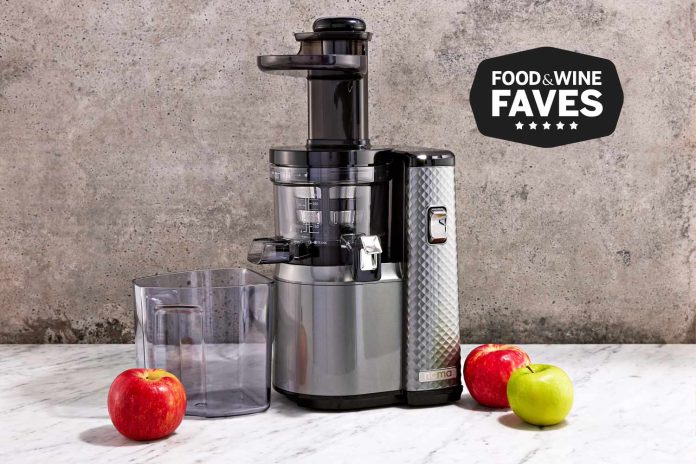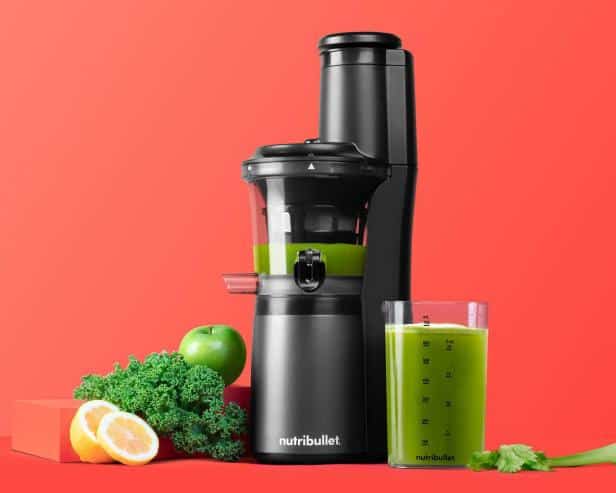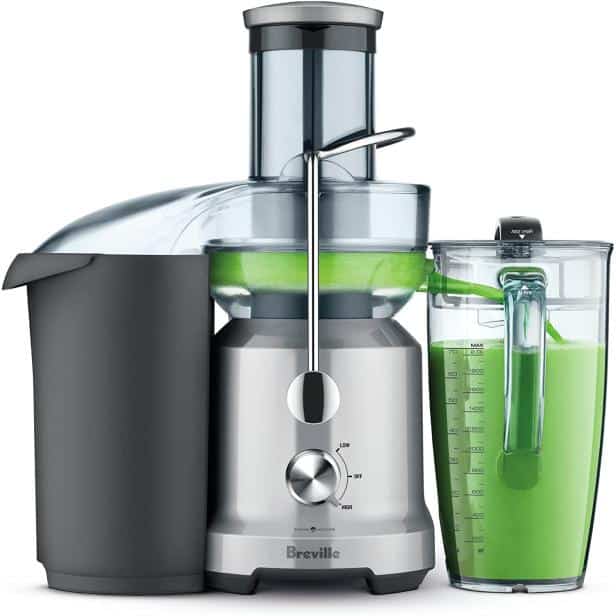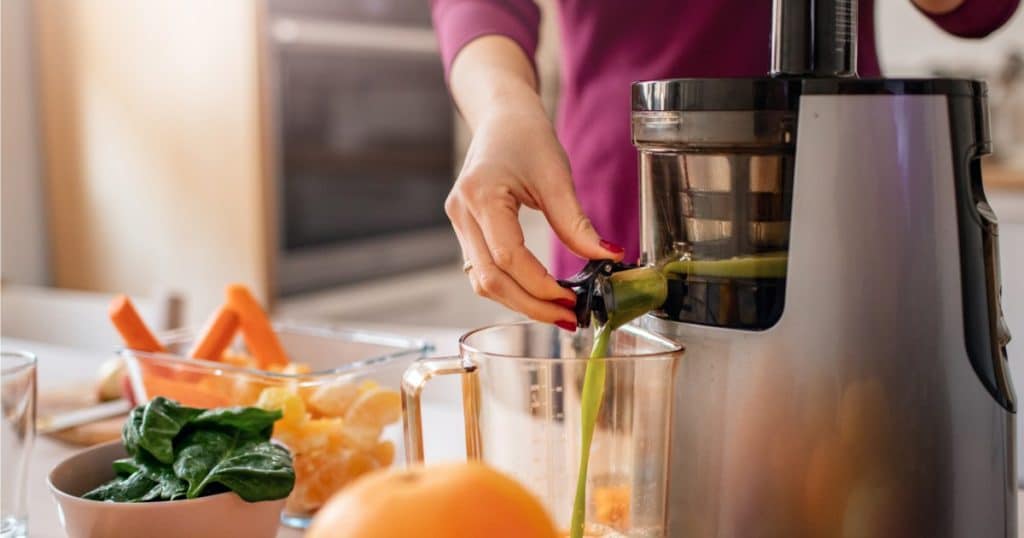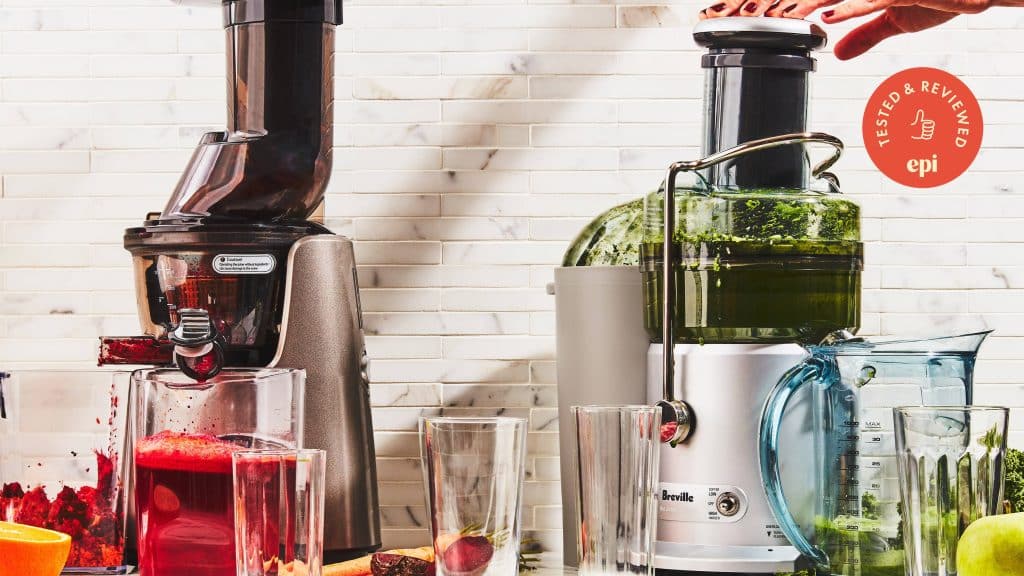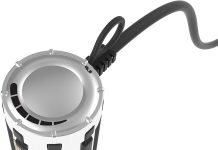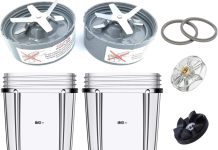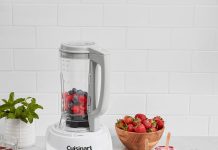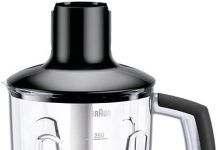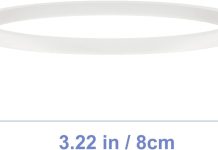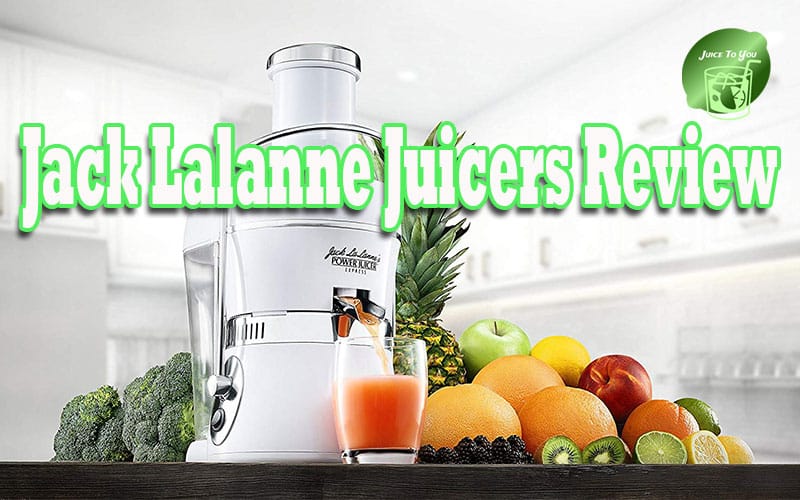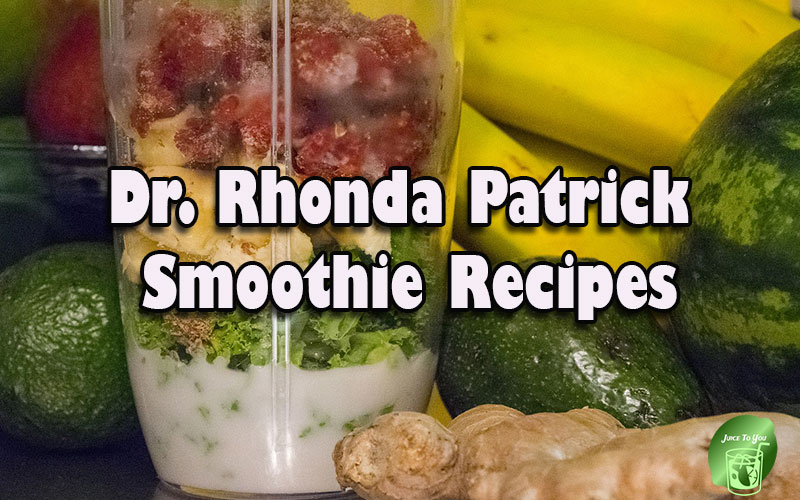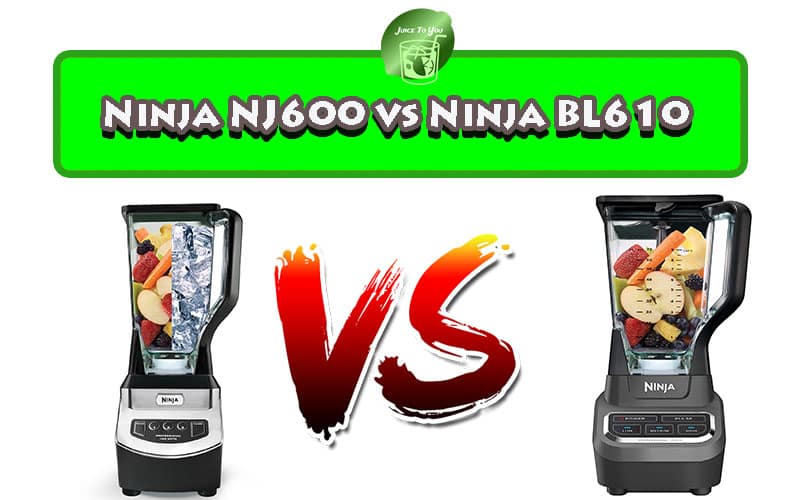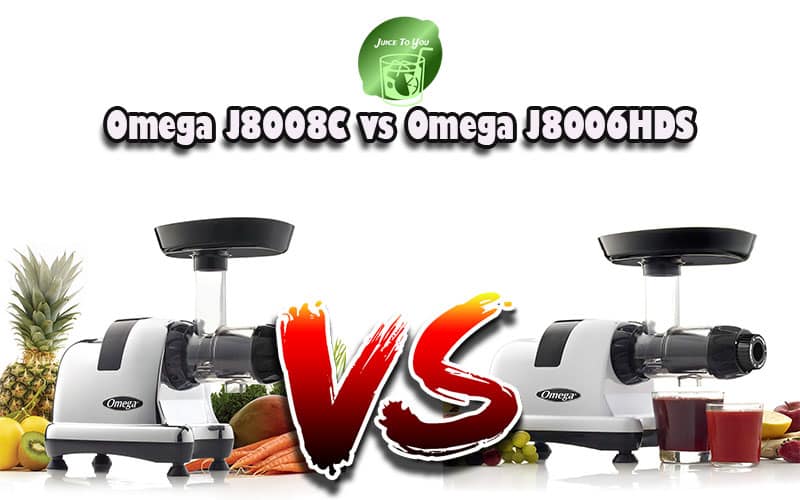Are you looking to refresh your daily routine with some nutritious homemade juice?
Deciding on the right juicer can be challenging, with countless options flooding the market.
But fret not, as we’ve got your back! In this article, we’ll guide you through the maze of juicers, exploring their features and benefits so you can make an informed decision and find the perfect juicer to suit your needs.
Say goodbye to store-bought juices and embark on a journey to find the juicer to take your wellness game to the next level!
Review contents
Types of Juicers
When it comes to juicers, there are several different types. Each type has unique features and advantages, so it’s essential to understand the differences before purchasing. This article will explore the various types of juicers available on the market, including centrifugal juicers, masticating juicers, twin gear juicers, citrus juicers, and manual juicers. By the end of this comprehensive guide, you will be equipped with all the information you need to choose the perfect juicer for your needs.
Factors to Consider
Before diving into the specifics of each juicer type, it’s essential to consider a few key factors that will help determine which juicer is best for you. These factors include the noise level, ease of use, speed, cleaning, juice quality, and warranty. Let’s examine these factors and why they are essential when choosing a juicer.
Noise Level
Nobody wants to start their day with a loud noise from their kitchen. That’s why considering the noise level of a juicer is crucial, especially if you live in a small apartment or have close neighbors.
Centrifugal juicers tend to be the loudest due to their high-speed spinning blades while masticating and twin-gear juicers operate at a quieter level. Citrus and manual juicers are usually quieter since they don’t require any motorized components.
Ease of Use
Some juicers can be complicated to assemble, disassemble, and operate. If you value convenience and simplicity, investing in a juicer that is easy to use is essential. Centrifugal juicers are generally the easiest to use and require minimal setup.
On the other hand, masticating and twin-gear juicers may have more parts and a longer assembly process. Citrus and manual juicers are usually the simplest to use, as they typically involve just a simple pressing or squeezing motion.
Speed
If you’re always in a rush and need your morning juice fix ASAP, then the juicer’s speed is an essential factor to consider. Centrifugal juicers are known for their high-speed operation, allowing you to extract juice from various fruits and vegetables quickly.
Masticating and twin-gear juicers operate slower but provide more efficient and thorough juicing. Citrus and manual juicers also work relatively quickly, but the speed may vary depending on the size of the citrus fruit or the manual force applied.
Cleaning
Nobody likes spending ages cleaning up after juicing. That’s why considering the cleaning process of a juicer is vital. Centrifugal juicers are typically the easiest to clean, as most parts can be quickly rinsed off or placed in a dishwasher.
Masticating and twin-gear juicers may require more thorough cleaning due to their intricate parts, but many models offer easy disassembly and dishwasher-safe components. Citrus and manual juicers are generally the easiest to clean since they involve minimal parts and can often be rinsed or wiped down easily.
Juice Quality
The juicer’s juice quality is another essential factor to consider. Centrifugal juicers, due to their high-speed spinning, tend to generate more heat, which can impact the overall quality of the juice by potentially reducing nutrient content and increasing oxidation.
Masticating and twin-gear juicers operate slower, preserving more nutrients and producing higher-quality juice with better taste and texture. Citrus and manual juicers also yield excellent quality, extracting juice directly from the fruit without heat or oxidation.
Warranty
Investing in a juicer is a long-term commitment, so it’s essential to consider the warranty offered by the manufacturer. A good warranty will provide peace of mind and protect you from unexpected malfunctions or defects.
Centrifugal juicers usually come with shorter warranties, typically 1-3 years. Masticating and twin-gear juicers often offer more extended warranties, ranging from 5-15 years, reflecting their durability and reliability. Citrus and manual juicers may vary in warranty length, so checking with the manufacturer before purchasing is essential.
Now that we understand the critical factors to consider when choosing a juicer, let’s dive into the specifics of each juicer type and explore its pros, cons, and top picks.
Centrifugal Juicers
Centrifugal juicers are one of the most commonly found juicers on the market. These juicers use a high-speed spinning blade to extract juice from fruits and vegetables. They operate by shredding the produce and spinning it at high speeds to separate the juice from the pulp. Centrifugal juicers are known for their speed and efficiency, making them a popular choice for those short on time. Look at the pros, cons, and top picks for centrifugal juicers.
Pros
- Speed: Centrifugal juicers are high-speed, allowing you to quickly whip up a fresh glass of juice.
- Easy to use: Centrifugal juicers require minimal assembly and are generally straightforward.
- Wide chute: Many centrifugal juicers come with wide feeding chutes, allowing you to add whole fruits and vegetables without much prep work.
- Affordable: Centrifugal juicers are typically more affordable compared to other juicer types.
Cons
- Noise: Centrifugal juicers are known for loud operation due to the high-speed spinning blades.
- Potential nutrient loss: The high-speed spinning in centrifugal juicers can generate heat and introduce more oxidation, potentially reducing the nutrient content of the juice.
- Less efficient: Centrifugal juicers may not extract as much juice from leafy greens or harder produce compared to other juicer types.
- Shorter shelf life: The juice produced by centrifugal juicers tends to have a shorter shelf life due to increased oxidation.
Top Picks
- Breville JE98XL Juice Fountain Plus: This centrifugal juicer is a favorite among many juice enthusiasts. It offers high-speed juicing, a wide feeding chute, and a powerful motor at a reasonable price point.
- Hamilton Beach 67601A Big Mouth Juice Extractor: Another excellent option for an affordable and efficient juicer. This Hamilton Beach model features a large feeding chute, easy assembly, and a powerful motor for quick juicing.
- Cuisinart CCJ-500 Pulp Control Citrus Juicer: While technically a citrus juicer, this Cuisinart model can easily handle other fruits. It offers adjustable pulp control, easy cleanup, and a sleek design.
These top picks for centrifugal juicers provide excellent performance, ease of use, and good value for your money. However, it’s important to remember that each juicer has unique features and advantages, so it’s always a good idea to read reviews and consider your specific needs before making a final decision.
Masticating Juicers
Masticating juicers, also known as slow juicers or cold press juicers, operate at a slower speed compared to centrifugal juicers. These juicers use a single gear or an auger to crush and squeeze fruits and vegetables, gently extracting the juice.
Masticating juicers are renowned for their efficiency in extracting juice from all types of produce, including leafy greens and wheatgrass. Let’s explore the pros, cons, and top picks for masticating juicers.
Pros
- Juice quality: Masticating juicers operate at lower speeds, minimizing heat and oxidation, resulting in higher-quality juice with enhanced taste, texture, and nutrient content.
- Versatility: Masticating juicers can handle a wide range of produce, including leafy greens, hard fruits, and even nuts and soybeans for making nut milk and tofu.
- Higher yield: Masticating juicers extract more juice from the same amount of produce compared to centrifugal juicers, making them more efficient and cost-effective in the long run.
- Longer shelf life: The juice produced by masticating juicers has a longer shelf life due to reduced oxidation.
Cons
- Slower operation: Masticating juicers take more time to extract juice, as the slower speed requires more thorough squeezing and grinding.
- Price: Masticating juicers tend to be more expensive than centrifugal juicers due to their advanced technology and better quality of juice.
- More parts to clean: Masticating juicers often have more components and intricate designs, making them slightly more challenging to clean than centrifugal juicers.
- Requires more prep work: Most masticating juicers have narrower feeding chutes, necessitating more prep work in cutting and preparing the produce.
Top Picks
- Omega NC900HDC Juicer Extractor: This masticating juicer from Omega offers excellent performance and versatility. Its slow speed and dual-stage juicing system result in high-quality juice, and it can handle a wide range of produce, including leafy greens, fruits, and vegetables.
- Hurom H-AA Slow Juicer: Hurom is a renowned brand for masticating juicers, and the H-AA model is one of their best offerings. It features a stylish design, easy assembly, and exceptional juice quality.
- Tribest GSE-5050 Greenstar Elite Juicer: For those looking for top-notch performance and the ability to handle a variety of produce, the Greenstar Elite Juicer is an excellent choice. It utilizes twin gears for efficient juicing and offers impressive yield and quality.
These top picks for masticating juicers are highly regarded for their performance, durability, and juice quality. Consider your specific needs and preferences when choosing the perfect masticating juicer for your kitchen.
Twin Gear Juicers
Twin gear juicers, also known as triturating juicers, are considered the crème de la crème of juicing machines. These juicers use two interlocking gears to crush, grind, and extract juice from fruits and vegetables. Twin gear juicers are known for their exceptional efficiency and maximum juice yield, making them a favorite among hardcore juicing enthusiasts. Let’s explore the pros, cons, and top picks for twin-gear juicers.
Pros
- Maximum juice yield: Twin gear juicers are renowned for their exceptional extraction efficiency, resulting in the maximum amount of juice extracted from the produce.
- Versatility: These juicers can handle various produce, from soft fruits and leafy greens to hard vegetables, allowing endless juicing possibilities.
- Excellent juice quality: Twin gear juicers operate at low speeds, preserving nutrients and producing juice of the highest quality in terms of taste, texture, and nutrition.
- Longer shelf life: The juice produced by twin gear juicers has an extended shelf life due to minimal oxidation.
Cons
- Overall size: Twin gear juicers are generally larger and heavier than other juicer types, requiring more counter space and storage capacity.
- Price: Twin gear juicers are typically the most expensive on the market, reflecting their advanced technology and superior juice quality.
- Longer cleanup time: Due to their complex design and several parts, twin-gear juicers can take more time and effort to disassemble, clean, and reassemble.
Top Picks
- Tribest GPT-1303 Greenstar Pro Commercial Juicer: This professional-grade twin-gear juicer is the gold standard for anyone serious about juicing. It offers exceptional performance, durability, and juice quality, making it a top choice among juicing enthusiasts.
- Super Angel Premium Deluxe Juicer: The Super Angel Premium Deluxe Juicer is a powerhouse for juicing performance. It features stainless steel twin gears, a heavy-duty motor, and remarkable durability, making it an investment piece for severe juicers.
- Green Power KPE1304 Twin Gear Juicer: For those seeking a twin gear juicer at a relatively more affordable price point, the Green Power KPE1304 is an excellent choice. It offers solid performance, efficient juice extraction, and a sleek design.
These top picks for twin-gear juicers exemplify the pinnacle of juicing technology with their outstanding performance, durability, and juice quality. Remember that twin-gear juicers are a significant investment, so consider your needs and budget before purchasing.
Citrus Juicers
If you primarily enjoy citrus fruits and want a juicer designed explicitly for them, then a citrus juicer is the way to go. These juicers are designed to quickly and efficiently extract juice from citrus fruits, such as oranges, lemons, and limes. Citrus juicers are generally compact, affordable, and easy to use. Let’s explore the pros, cons, and top picks for citrus juicers.
Pros
- Ease of use: Citrus juicers are typically straightforward, often involving pressing or squeezing to extract the juice.
- Compact design: Most citrus juicers have a compact and space-saving design, making them an excellent choice for smaller kitchens or limited counter space.
- Affordable: Citrus juicers are generally the most affordable on the market, making them ideal for those on a budget.
- Quiet operation: Citrus juicers do not require a motor, resulting in a near-silent operation.
Cons
- Limited to citrus fruits: These juicers are designed specifically for citrus fruits and may not be suitable for juicing other types of produce.
- Manual labor: Citrus juicers require manual effort, typically manually pressing or squeezing the fruit to extract the juice.
- Lower juice yield: Compared to other juicer types, citrus juicers may have a lower juice yield, as they are designed explicitly for smaller citrus fruits.
Top Picks
- Cuisinart CCJ-500 Pulp Control Citrus Juicer: This versatile citrus juicer from Cuisinart can handle many citrus fruits. It offers adjustable pulp control, easy cleanup, and a sleek design.
- Proctor Silex 66331 Alex’s Lemonade Stand Citrus Juicer: Perfectly suited for juicing lemons, limes, and oranges, this Proctor Silex citrus juicer features a simple one-touch operation, a pulp control dial, and a compact design.
- Breville 800CPXL Die-Cast Stainless-Steel Motorized Citrus Press: For those who prefer an electric citrus juicer, the Breville 800CPXL is a top choice. It features a powerful motor, easy-to-use operation, and durable stainless steel construction.
These top picks for citrus juicers provide efficient juicing, ease of use, and affordability. Whether you’re a regular citrus juice enthusiast or enjoy the occasional glass of fresh orange juice, these juicers will surely meet your needs.
Manual Juicers
If you’re looking for a juicer that requires no electricity and offers simplicity and portability, then a manual juicer might be the perfect choice. Manual juicers come in various designs, including handheld squeezers, press juicers, and reamer-style juicers. These juicers are ideal for those who prefer a hands-on approach and appreciate the nostalgia of manually extracting juice. Let’s explore the pros, cons, and top picks for manual juicers.
Pros
- Portability: Manual juicers are compact and lightweight, making them easy for travel, camping, or outdoor activities.
- No electricity required: These juicers operate solely through manual force, making them an excellent choice for those seeking an environmentally friendly option and those living in regions with limited access to electricity.
- Quiet operation: Manual juicers do not produce any noise, providing a silent and peaceful juicing experience.
- Easy to clean: Most manual juicers have minimal parts and are easy to disassemble and clean.
Cons
- Manual labor: Using a manual juicer requires physical effort, as you must manually press, squeeze, or twist the fruit to extract the juice.
- Limited to specific fruits: Some manual juicers are designed specifically for certain fruits, such as citrus or wheatgrass, limiting their versatility.
- Lower juice yield: Compared to electric juicers, manual juicers may have a lower juice yield due to the manual extraction process.
Top Picks
- Zulay Professional Citrus Juicer: This heavy-duty manual citrus juicer is perfect for anyone who loves freshly squeezed citrus juice. Its ergonomic design, sturdy construction, and efficient juice extraction make it a top choice.
- Chef’n FreshForce Citrus Juicer: The Chef’n FreshForce is a handheld squeezer that makes juicing citrus fruits a breeze. It features a unique dual-gear mechanism for effortless squeezing and superior juice extraction.
- Lexen GP27 Original Healthy Juicer: For those interested in juicing wheatgrass and leafy greens, the Lexen GP27 is an excellent manual juicer. It offers efficient juice extraction, easy assembly, and a compact design.
These top picks for manual juicers provide convenience, simplicity, and portability, allowing you to enjoy freshly squeezed juice without needing electricity. Consider your specific needs and preferences when choosing the best manual juicer for your lifestyle.
Budget Considerations
Juicers vary significantly in price, from affordable options for those on a budget to high-end models with advanced features. If you’re looking for the best juicer that won’t break the bank, here are some budget-friendly options for each type.
Best Budget Centrifugal Juicers
- Hamilton Beach 67601A Big Mouth Juice Extractor
- BLACK+DECKER JE2200B Fruit and Vegetable Juice Extractor
- Mueller Austria Juicer Ultra Power
Best Budget Masticating Juicers
- AICOK Slow Masticating Juicer
- KOIOS Slow Masticating Juicer Machine
- Smeg CJF01CRUS Citrus Juicer
Best Budget Twin Gear Juicers
- Tribest GSE-5000 Greenstar Elite Cold Press Juicer
- Sana 707 Twin Gear Juicer
- Super Juicer Stainless Steel Commercial Grade Wheatgrass Juicer
Best Budget Citrus Juicers
- Proctor Silex 66331 Alex’s Lemonade Stand Citrus Juicer
- BLACK+DECKER CJ650W Citrus Juicer
- Dash Citrus Juicer Extractor
Best Budget Manual Juicers
- Zulay Professional Citrus Juicer
- Chef’n FreshForce Citrus Juicer
- Lexen GP27 Original Healthy Juicer
These budget-friendly options provide excellent value for their price, allowing you to enjoy the benefits of juicing without breaking the bank. Don’t let a limited budget stop you from embracing a healthier, juicier lifestyle!
Conclusion
When choosing the best juicer for your needs, you must consider noise level, ease of use, speed, cleaning, juice quality, and warranty.
Centrifugal juicers offer speed and convenience, masticating juicers provide higher juice quality and versatility, twin gear juicers excel in maximum juice yield and quality, citrus juicers are ideal for citrus fruits, and manual juicers offer simplicity and portability.
Each juicer type has pros and cons, as well as top picks catering to various preferences and budgets.
By understanding the differences between juicer types and carefully considering your specific needs, you can confidently select the perfect juicer to accompany you on your juicing journey. Cheers to a healthier, juicier life!

